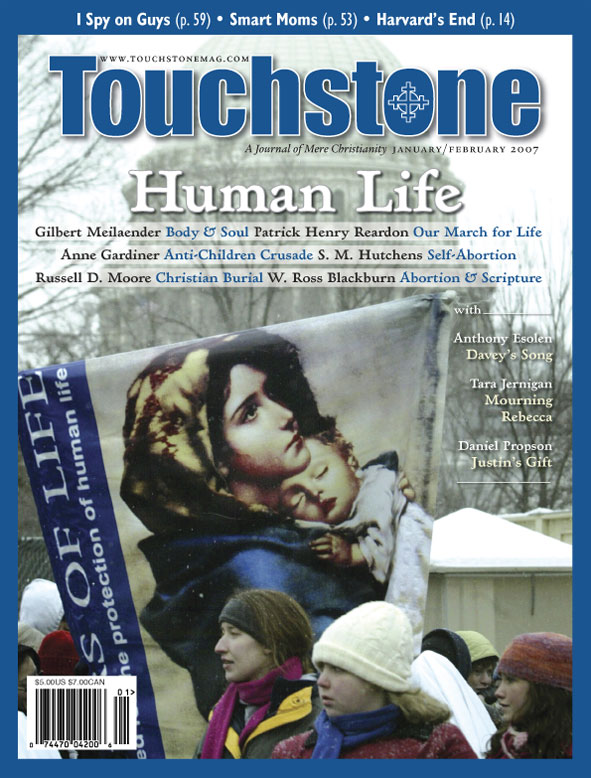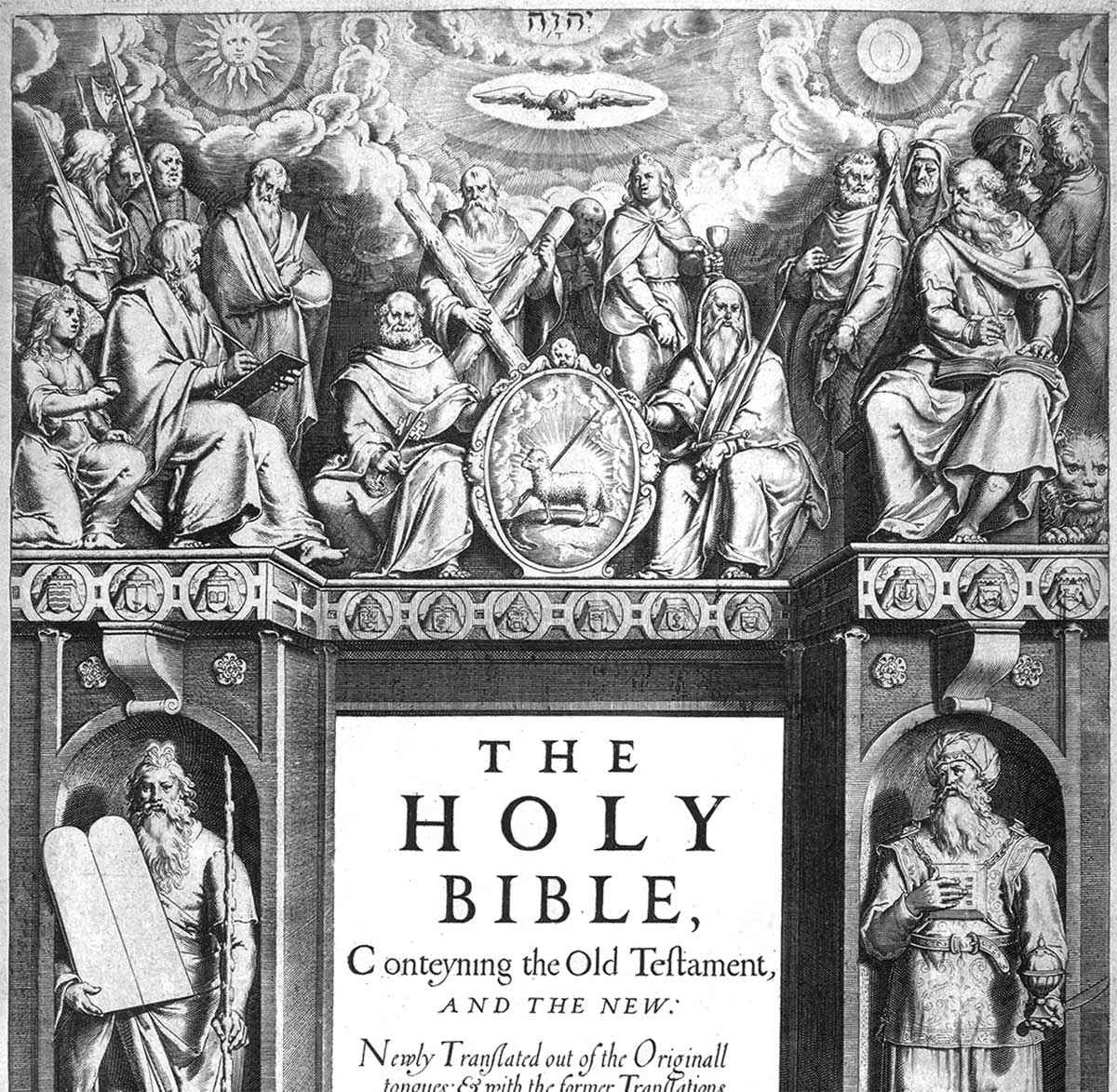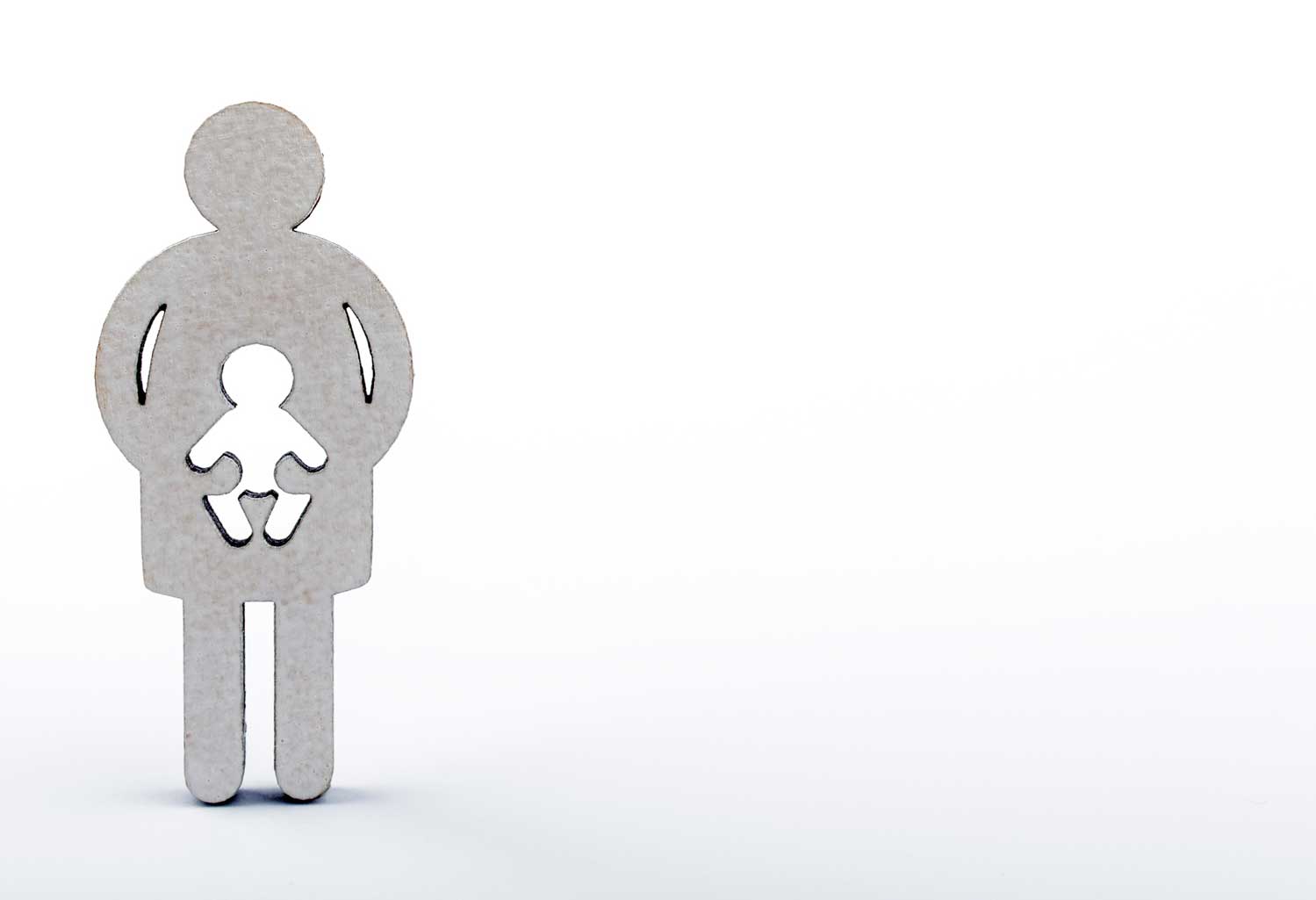Smart Moms
The Mommy Brain
by Katherine Ellison
Perseus Books Group, 2005
(279 pages, $15.00, paperback)
reviewed by Jocelyn Mathewes
Everything changes,” muses a character in Nursery Crimes, written by retired public defender Ayelet Waldman, speaking of having children. “Your relationship is destroyed. Your looks are shot. Your productivity is devastated. And you get stupid.” Motherhood, many say, makes you dumb.
A “pessimistic chorus” of parents, non-parents, career women, stay-at-home moms, and others believe this to be a near “proven scientific fact,” notes Katherine Ellison in The Mommy Brain. She recounts a discouraging study in which “researchers showed audiences videotapes of a woman in various workplace situations—the same woman, the same work, but in some scenes wearing a prosthesis so that she’d appear pregnant—the ‘pregnant’ woman was rated less competent and less qualified for promotion.”
This debilitating perception—that “part of your brain exits with the placenta”—is a relatively recent lie, says Ellison, but a culturally dominant one nevertheless. Written in a personal and conversational tone, with an everyday-woman friendliness, The Mommy Brain shows that motherhood makes women anything but mentally incapacitated.
Ellison cites biological research to show how motherhood, “by means of a dynamic combination of love, genes, hormones, and practice” changes the human brain in positive, intelligence-enhancing ways, “baby-boosting” mothers’ brains in five areas: perception, efficiency, resiliency, emotional intelligence, and motivation.
Booster Babies
Plasticity—the ability of the brain to be altered with new, positive, emotionally charged, and challenging experiences—is the key. Motherhood is one of the ultimate learning experiences, especially since “human childhood lasts longer than any species on earth,” and for humans, motherhood is “fortified by powerful hormones and secured with rigid cultural conventions,” to ensure the survival and success of their offspring.
These “powerful hormones”—oxytocin (the “cuddle hormone”), estrogen, progesterone, and cortisol (the “stress hormone”)—combined with a little bit of old-fashioned parenting practice, may prove to be among the strongest brain-boosters. The “simmering” of female brains in these powerful, attention- and learning-enhancing hormones causes mothers’ sensory perceptions to increase in sensitivity. In one study, mother rats experienced “gains in learning and memory” as demonstrated by their performance in a maze.
But hormones are only half the story. When mothers and infants interact, they often imitate each other’s facial expressions, exercising areas of their cerebral cortexes involved in empathy. Self-restraint—a skill that especially comes in handy with unruly children—exercises areas of the frontal lobes. All the social practice that mothers get with children increases their overall emotional intelligence.
And during motherhood, “we [mothers] may be at our most efficient . . . for good reason.” Evolution may have given an advantage to women who managed their time well—a much-needed modern life skill.
Mothers also are better able to manage stress. When faced with a “fight or flight” response, their brains, unlike men’s, release more oxytocin in response to stress. This calms and comforts them, enabling mothers to respond with level heads to threats in the environment—a kind of resiliency.
While fathers don’t experience the kind of hormonal changes mothers do, they can experience “baby-boosted” brains as well. Some scientists believe that the pheremones involved in “sympathy weight gain” in men while their partner is pregnant may also help prepare them for the challenges of childrearing.
But you don’t have to be a parent to benefit, either. Many of the benefits—such as an increase in emotional intelligence and efficiency—can also be gained by other adults who work with children, such as childcare providers, teachers, aunts, and uncles.
Free Mothers
The latter sections of The Mommy Brain deal with the challenges and difficulties mothers face in the workforce and in the political arena. The skills learned during motherhood “can be an asset on the job and at home,” but are often overlooked because motherhood is thought of as a liability.
This stigma makes many companies reluctant to offer flexible working hours, encourage breastfeeding, or provide childcare options to women who work and manage a family. But this doesn’t stop mothers from having their say. Married mothers are, on average, more politically active than their single counterparts, and have historically banded together for causes such as drunk-driving prevention, better working conditions, suffrage, and education.
At the beginning of The Mommy Brain, Ellison remarks, “The potential to become smarter with motherhood may turn out to be one of this century’s most hopeful ideas.” She highlights what seems like common sense: that being held ultimately responsible for another’s well-being will challenge, even force you to change your life and learn new behaviors.
But what is new about Ellison’s spin on motherhood is its positivity. Being obligated and dutiful is not something we’re eager to embrace in a culture where “freedom” means a complete lack of restriction, obligation, and duty—all things required of parents when raising children.
Though Ellison’s voluminous research is admirable, given that research into brain differences between the sexes is a relatively new field, only recently opened in the 1960s, much of that research may remain fundamentally inapplicable. Early on in her book, she states that readers must keep in mind that conclusions drawn from experiments on animals do not necessarily apply to humans. And oxytocin, it turns out, is something of an enigma: Scientists can measure the amount of oxytocin in the blood, but are unable to track its activity in the brain.
Inspiring & Practical
Though somewhat shakily founded, The Mommy Brain is still an inspiring book for parents and non-parents alike. Even those with little or no scientific knowledge can understand it, and the concluding chapter, offering ten practical tips for new mothers, adds to its appeal.
The Mommy Brain reassures mothers—even (so strong is the bias against motherhood in our culture) traditional mothers—who feel that motherhood is the period of drudgery, servitude, and decline described by Waldman, that their work is valid, challenging, and worthwhile. It also prepares those not yet parents for the dramatic changes and demands of raising children.
Jocelyn Mathewes is a graphic designer for the National Fatherhood Initiative (www.fatherhood.org), and is working on her documentary photography series, Women with Icons, recently shown at the Amalie Rothschild Gallery in Baltimore. She is married and attends Holy Cross Orthodox Church in Linthicum, Maryland.
bulk subscriptions
Order Touchstone subscriptions in bulk and save $10 per sub! Each subscription includes 6 issues of Touchstone plus full online access to touchstonemag.com—including archives, videos, and pdf downloads of recent issues for only $29.95 each! Great for churches or study groups.
Transactions will be processed on a secure server.
more from the online archives
calling all readers
Please Donate
"There are magazines worth reading but few worth saving . . . Touchstone is just such a magazine."
—Alice von Hildebrand
"Here we do not concede one square millimeter of territory to falsehood, folly, contemporary sentimentality, or fashion. We speak the truth, and let God be our judge. . . . Touchstone is the one committedly Christian conservative journal."
—Anthony Esolen, Touchstone senior editor










